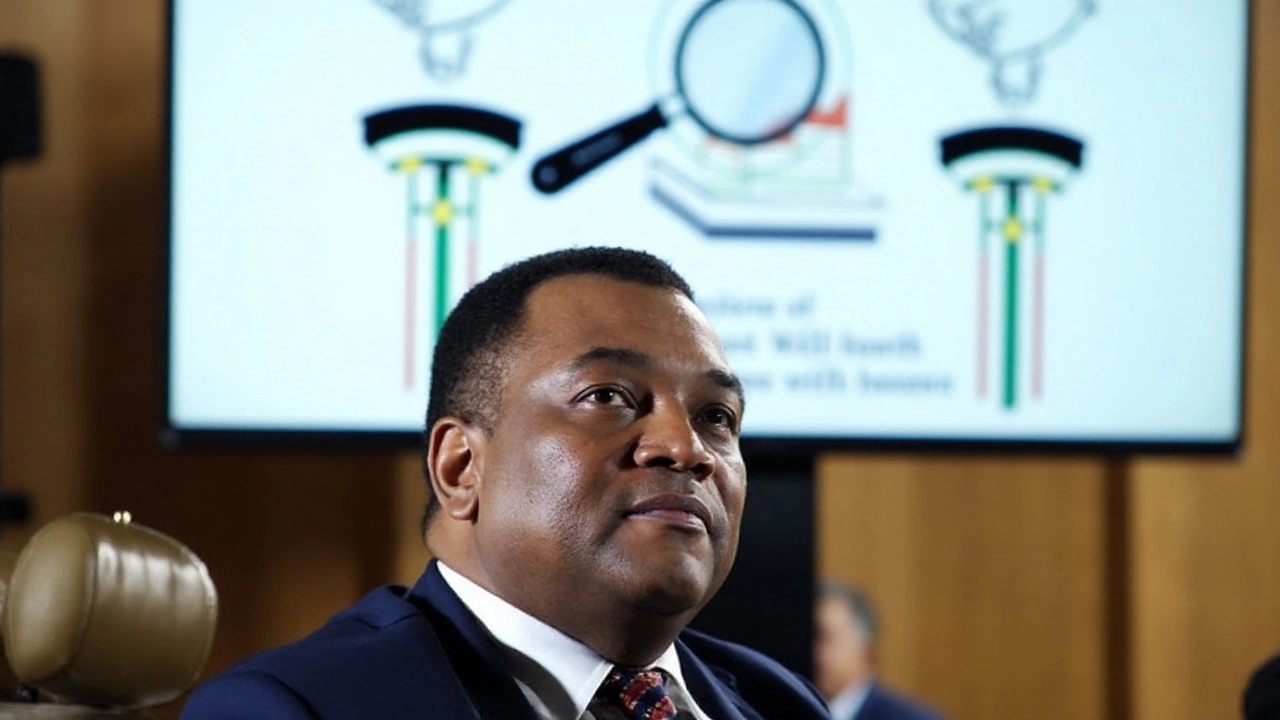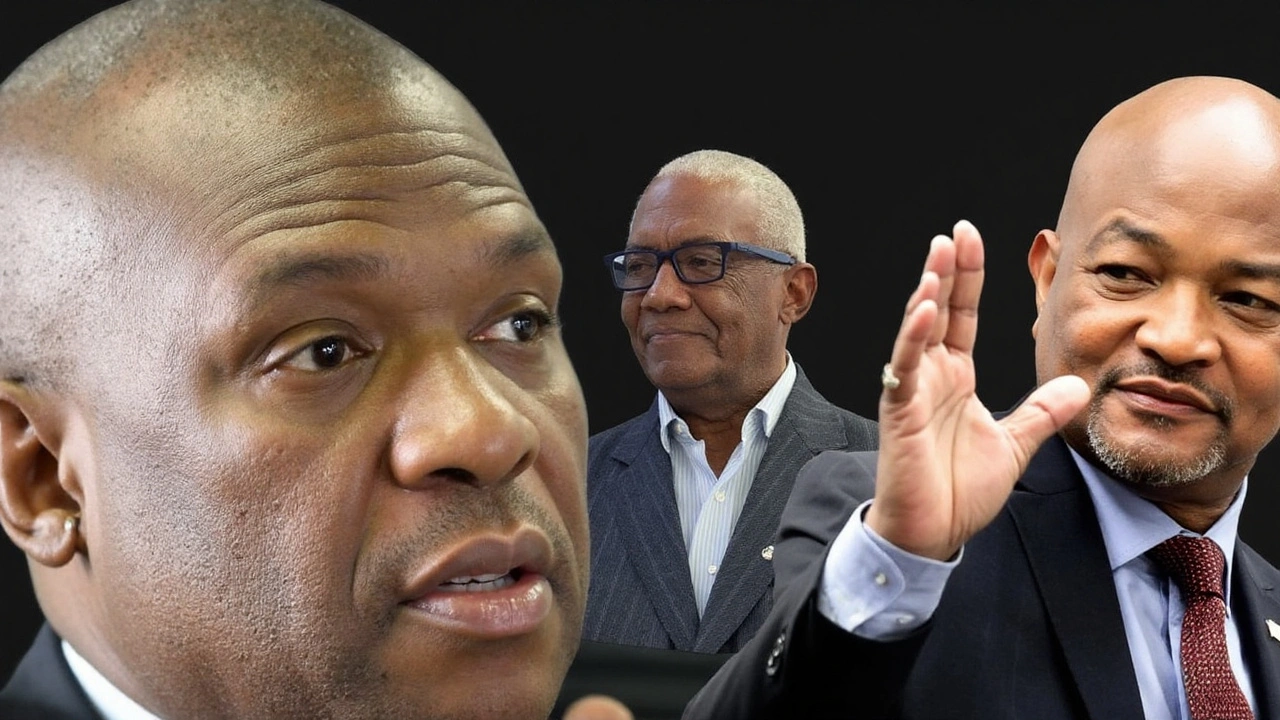What the Commission Heard
During a tense session of the Madlanga Commission of Inquiry, several senior police figures laid out a troubling picture of political interference. KwaZulu‑Natal Police Commissioner Nhlanhla Mkhwanazi, National Police Commissioner Fannie Masemola and SAPS legal services head Major General Marga van Rooyen all testified about Police Minister Senzo Mchunu’s decision to dissolve the Political Killings Task Team. Their accounts converge on one unsettling fact: the minister’s anger was triggered when the task team finally cracked a case involving the assassination of a local councillor.
According to Masemola, the breakthrough came after district police seized two men with an illegal firearm. The district commissioner, suspecting a link to the councillor’s murder, called in the task team. Within days the unit pieced together evidence that tied the suspects to the killing, a development that apparently displeased Mchunu. The minister allegedly objected not because of procedural concerns, but because the task team had taken control of case files and publicly highlighted the connection.
Van Rooyen’s legal testimony pushed the narrative further. She argued that no minister has the power to unilaterally disband a specialised police unit. Such structural decisions fall under the exclusive jurisdiction of the National Commissioner, a safeguard designed to keep political agendas out of day‑to‑day policing. Her remarks underscored a breach of the SAPS Act, suggesting that Mchunu’s order was not only ill‑judged but outright illegal.
Adding to the chorus, security strategist Andy Mashaile seized the moment to call for a comprehensive overhaul of the South African Police Service. He claimed that Masemola’s acquiescence to the minister’s move signalled a dangerous erosion of institutional checks and balances.

Legal and Political Implications
The fallout from these testimonies is already rippling through South Africa’s political landscape. The Political Killings Task Team has been a cornerstone in probing politically motivated murders, a scourge that has plagued the nation for years. Its dissolution threatens to stall ongoing investigations, leaving victims’ families without closure and emboldening perpetrators.
Critics argue that the minister’s actions reflect a broader pattern of politicising the police force, especially ahead of upcoming elections. If the cabinet can dismantle a unit that shines a light on political violence, what other safeguards might be next? Opposition parties have seized on the commission’s findings, demanding a parliamentary inquiry into the minister’s authority and motives.
On the legal front, the National Commissioner’s office is expected to file a formal challenge against the minister’s order. Should the courts affirm van Rooyen’s stance, it could set a precedent that reinforces the separation of powers within the policing hierarchy.
Meanwhile, the Madlanga Commission continues to hear evidence, with more witnesses slated to appear in the coming weeks. Each testimony adds another layer to an already complex saga that blends law, politics and public safety. What remains clear is that the controversy over the task team’s disbandment has become a flashpoint for broader debates about accountability, the rule of law and the fight against political killings in South Africa.


 Sports
Sports
अभिषेख भदौरिया
September 25, 2025 AT 20:55It is deeply regrettable to observe the apparent erosion of institutional safeguards within the policing framework. The testimonies presented illuminate a concerning confluence of political ambition and administrative overreach, which inevitably undermines public confidence. One must acknowledge the profound distress experienced by the families of victims when due process appears compromised. While the legal avenues for redress remain, the moral imperative to uphold transparency cannot be overstated.
jitendra vishwakarma
September 26, 2025 AT 10:49Man, this whole thing is just a mess, it’s like they dont even care bout justice anymore. The minister’s decision feels like a total power play, definatly not about public safety. It’s a real eye‑opener on how politics can hijack law enforcement.
Ira Indeikina
September 27, 2025 AT 00:42This is an outright assault on the very notion of accountability! When a minister can unilaterally dismantle a task force that shines a light on corruption, it reveals the fragile foundations of our governance. The very fabric of liberty is being torn asunder, and we cannot stand idly by while it unravels.
Shashikiran R
September 27, 2025 AT 14:35Such irrelavent moves by those in power are downright immoral and irrespnsible. The government is betraying its oath to protect citizens, and this kind of goaveernment overreach cannot be tolerated. We must call out this behaviour for what it truly is – an abject failure of ethical duty.
SURAJ ASHISH
September 28, 2025 AT 04:29Another instance of elite meddling. Nothing new.
PARVINDER DHILLON
September 28, 2025 AT 18:22We need to keep the conversation constructive and focus on solutions 🌱. While the situation is disheartening, I believe a collaborative approach can restore public trust 😊. Let’s keep the dialogue open and supportive.
Nilanjan Banerjee
September 29, 2025 AT 08:15One cannot help but lament the tragic descent into bureaucratic hubris that this debacle exemplifies. The dissolution of a unit tasked with exposing political malfeasance reads like a Shakespearean tragedy, where power, unchecked, drowns the virtues of justice. Such calamities demand a renaissance of moral clarity within our institutions.
sri surahno
September 29, 2025 AT 22:09The narrative presented by the commission obscures a deeper, orchestrated campaign to neutralize dissent within the security apparatus. Every maneuver by the minister appears calibrated to consolidate authority, suggesting a premeditated agenda that extends beyond a single task force. Historical patterns reveal that when the state perceives investigative bodies as threats, it systematically dismantles them under the veneer of legal propriety. The timing of the disbandment, coinciding with upcoming elections, cannot be dismissed as mere coincidence. Evidence points toward a concerted effort to silence inquiries that might expose high‑level collusion in political assassinations. Moreover, the legal justifications cited by the minister lack substantive precedent, indicating a possible exploitation of ambiguous statutory language. This maneuver aligns with previous incidents where executive overreach was cloaked in administrative decree. Citizens deserve transparency, yet the opacity surrounding the minister’s decision fuels speculation about hidden motives. The involvement of senior police officials in the testimony may reflect internal pressure to conform to political directives. It is plausible that the task team’s findings threatened entrenched networks of patronage, prompting a swift reaction. Such actions erode the rule of law, as they bypass established checks and balances designed to protect institutional integrity. International observers have noted similar tactics employed by regimes seeking to perpetuate unchecked power. If unchecked, this precedent may embolden further erosion of democratic safeguards. The legal community must scrutinize the minister’s authority with rigorous scrutiny to prevent a slippery slope. Ultimately, vigilance from civil society remains the paramount defense against covert subversion of justice.
Varun Kumar
September 30, 2025 AT 12:02The minister’s interference is a direct threat to national unity; only a strong, uncompromising stance will protect our sovereignty.
Madhu Murthi
October 1, 2025 AT 01:55Enough of this nonsense 😒.
Amrinder Kahlon
October 1, 2025 AT 15:49Oh great, another political drama-just what we needed to spice up the news cycle.
Abhay patil
October 2, 2025 AT 05:42We should aim for constructive dialogue and avoid further division by focusing on transparent reforms that restore trust in law enforcement while respecting due process
Amber Brewer
October 2, 2025 AT 19:35For those seeking clarification, the SAPS Act delineates that only the National Commissioner can authorize structural changes to specialised units. This legal framework is intended to prevent political interference, and any deviation could be subject to judicial review.
Kim Coulter
October 3, 2025 AT 09:29From a patriotic standpoint, any attempt to weaken the authority of our security forces undermines the nation's stability. It is essential that we safeguard the chain of command against foreign and domestic subversion, lest we compromise our sovereign interests.
Michelle Toale-Burke
October 3, 2025 AT 23:22This is heartbreaking 😢. The thought of families left in limbo is unbearable, and the injustice feels personal to every South African who cares about fairness.
Amy Paradise
October 4, 2025 AT 13:15Sending love and strength to everyone affected ❤️. Let’s keep raising our voices together and push for the accountability we deserve! 🙌